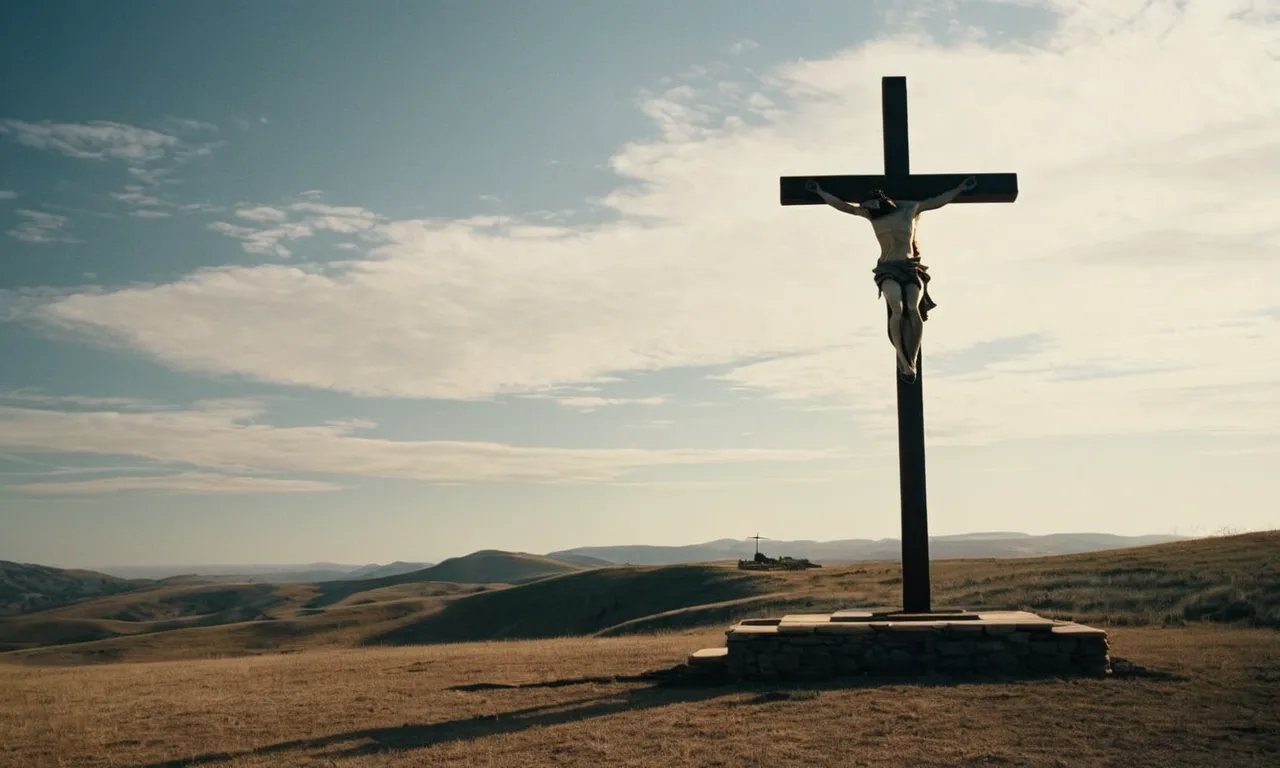How Does Jesus’S Death Save Us From Our Sins?
If you ask a Christian ‘how does Jesus’s death save us from our sins? ‘, you’ll likely get a complex theological answer involving concepts like substitutionary atonement, propitiation, and sacrificial lambs.
But at its core, it comes down to this: Jesus bore the punishment for our sins so that we could be forgiven and have a restored relationship with God.
In this comprehensive article, we’ll unpack the meaning behind this centeral Christian belief by exploring questions like:
– Why did Jesus have to die for our sins?
– What actually happened on the cross according to the Bible?
– What does it mean that Jesus died ‘in our place’?
– How does His sacrifice provide salvation?
– And more.
The Wages of Sin Is Death
Our Problem: Separation from God Due to Sin
The Bible teaches that sin leads to death because it separates us from God (Romans 6:23). When Adam and Eve first sinned, they experienced spiritual death as their intimate connection with God was broken (Genesis 3:8-9).
Ever since then, humans have lived in this fallen, sinful state, alienated from God who is holy and cannot tolerate sin (Isaiah 59:2). This separation prevents us from experiencing the fullness of joy and life that comes from being united with our Creator.
God did not create human beings to live independently from Him. We were designed for relationship with God. But sin drives a wedge in that relationship, putting up a barrier between God and us. Sin essentially means “missing the mark” – falling short of God’s perfect standards.
Every human struggles with a sinful nature and makes choices to rebel against God and harm others. Our natural desires are out of alignment with God’s wise and loving ways. This sin problem infects all humans and even creation itself (Romans 8:22).
Why Couldn’t God Just Forgive Without Punishment?
God is perfectly just and righteous, meaning He always does what is right and fair according to His moral law. God’s justice flows out of His holiness – His morally pure character which cannot tolerate wickedness or overlook sin (Habakkuk 1:13).
When His moral law is broken, the scales of justice must be balanced somehow. Disobeying an infinitely holy God is an infinitely serious offense which has dire consequences.
Though God deeply loves humanity and desires a restored relationship with us, His justice prevents Him from casually dismissing sin. He cannot merely let lawbreakers off the hook whenever He feels like it. That would compromise His righteousness.
A penalty must be paid to atone for the offense against God’s honor. And no ordinary human sacrifice would ever suffice to pay for mankind’s immeasurable debt owed due to our rebellion and crimes against our Creator.
The consequence had to match the magnitude of the trespass if God’s justice were to be satisfied.
Jesus Bore Our Sins on the Cross
Old Testament Sacrifices Pointed to Christ
In the Old Testament, God instituted a system of animal sacrifices to atone for sin and point forward to the coming Messiah. Bulls, goats, lambs and other clean animals were sacrificed on the altar as substitutes for the sinner (Leviticus 4:20, 26, 31).
These sacrifices showed the seriousness of sin, as blood had to be shed, and pointed to the need for a perfect sacrifice to completely deal with sin.
The passover lamb sacrificed and eaten at Passover symbolized God’s protection of the Israelites and deliverance from slavery in Egypt (Exodus 12). It also foreshadowed Jesus, the Lamb of God, who would deliver us from slavery to sin (John 1:29; 1 Corinthians 5:7).
Jesus Was the Perfect Sacrificial Lamb
Animal sacrifices could only temporarily cover sin, but Jesus’ sacrifice took away sins completely (Hebrews 10:1-4, 11-14). Jesus was the perfect sacrifice, being fully God and fully man, sinless and holy. Only Jesus’ blood could fully atone for our sins (Hebrews 9:11-14).
Like the Passover lamb, Jesus’ death delivers us from slavery to sin and death. As John the Baptist said, Jesus is “the Lamb of God, who takes away the sin of the world!” (John 1:29). He fulfilled Isaiah’s prophecy of the suffering servant who would be “led like a lamb to the slaughter” for our sins (Isaiah 53:7; Acts 8:32-33).
On The Cross, God’s Wrath Was Poured Out On Jesus
On the cross, Jesus bore the penalty for our sins by enduring God’s wrath in our place. As 2 Corinthians 5:21 says, “God made him who had no sin to be sin for us, so that in him we might become the righteousness of God.”
Though Jesus was perfect and blameless, He took upon Himself the punishment we deserve.
Jesus’ suffering shows how seriously God takes sin. His holiness and justice demand that sin’s penalty must be paid. But in His infinite love, God sent His own Son to pay that penalty for us. God’s righteous wrath was poured out on Christ instead of us sinners (Romans 3:25-26).
Because of Jesus’ substitutionary sacrifice, we can be forgiven and reconciled to God. Believing in Jesus’ death on the cross for our sins is essential for salvation (Romans 3:21-26; 5:6-11). His atoning sacrifice is the very heart of the gospel and our hope.
We Are Justified Through Christ’s Sacrifice
The Great Exchange: He Took Our Punishment
According to the Bible, all humans have sinned and face eternal separation from God (Romans 3:23). However, Jesus took the punishment for our sins by dying on the cross, even though he was sinless (1 Peter 2:24).
This act is described as a “great exchange” – Jesus took our sin and guilt and in return gave us his righteousness before God (2 Corinthians 5:21).
Justified Before God Through Faith in Christ
We cannot earn salvation through good deeds – we are justified by God’s grace as a gift through faith in Jesus (Ephesians 2:8-9). By trusting in Christ’s sacrifice on our behalf, our relationship with God is restored.
Although we were once God’s enemies, we are now declared righteous, as if we had never sinned (Romans 5:1).
This justification is made possible because of Jesus. He lived the perfect life that we could not, and died in our place, paying the penalty for sin. When we repent and believe this good news, placing our faith in him, we receive forgiveness and are reconciled to God (Acts 3:19).
United With Christ Through Spiritual Rebirth
All who believe in Jesus Christ are spiritually “born again” and united with him (John 3:3). Through faith, Christ’s righteousness is credited to us, and we are seen as righteous in God’s sight. This comes through the regenerating work of the Holy Spirit (Titus 3:5-7).
This spiritual rebirth and union with Christ also enables us to die to sin and live righteously (1 Peter 2:24, Romans 6:11). The power of sin is broken, and we are set free to honor God with our lives, whereas before we were enslaved to sin.
What This Means for Our Lives Today
Freedom From Guilt And Condemnation
Jesus’ sacrifice on the cross liberates us from the burden of sin and guilt. When we accept His gift of salvation, we are set free from condemnation and eternal punishment (Romans 8:1). This freedom allows us to approach God with confidence and boldness (Hebrews 4:16).
We no longer have to live under the weight of shame, regret, or feeling unworthy. What an amazing gift!
The forgiveness Christ offers is complete – our sins are removed “as far as the east is from the west” (Psalm 103:12). He separates our transgressions from us, remembering them no more (Isaiah 43:25). We are made completely new creations in Him (2 Corinthians 5:17).
This truth should bring us incredible joy and peace.
Motivated to Obey and Honor God Out of Love
Christ’s sacrifice demonstrates the depth of God’s love for us, even while we were still sinners (Romans 5:8). As we grow to understand this love more fully, our motivation for obeying and honoring God changes.
We shift from trying to earn God’s favor through rigid rule-following, to responding to His amazing grace with heartfelt love and devotion (1 John 4:19).
This transforms the Christian life from a list of dreary religious duties into a joyful pursuit of knowing Christ more intimately. Our focus shifts from worrying about external behaviors, to asking Jesus to change our hearts.
As we see sin’s destructive nature more clearly, we develop a genuine desire to walk in holiness and avoid grieving God’s Spirit within us.
Conclusion
In summary, Jesus bore the wrath of God toward sin in our place on the cross so that we could be forgiven, saved from condemnation, and reconciled to God. This was accomplished not because of any good deeds on our part, but purely by God’s mercy and grace.
Trusting fully in Christ’s sacrifice for our sins is what justifies us before God and allows us to have new life through his Spirit. This amazing gift should fill us with immeasurable gratitude, free us from guilt and fear, and motivate us to honor God with our lives.








